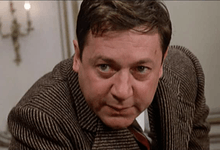Ugo Fantozzi
Ugo Fantozzi is a fictional character, appearing in Italian literature and film, created by Paolo Villaggio. The character, initially part of Villaggio's television monologues, later became protagonist of a series of short stories published at first on newspapers, later in collections, which in turn inspired a successful film series, starring Villaggio himself as the main character.
| Ugo Fantozzi | |
|---|---|
| Fantozzi character | |
 Ugo Fantozzi (Paolo Villaggio) in the film Fantozzi | |
| First appearance | Fantozzi (novel - 1971) Fantozzi (1975 film) |
| Last appearance | Fantozzi 2000 - La clonazione (film - 1999) Tragica vita del ragionier Fantozzi (novel - 2012) |
| Created by | Paolo Villaggio |
| In-universe information | |
| Nickname | Fantocci, Pupazzi, Bambocci, Bacarozzi |
| Race | White |
| Occupation | accountant |
| Spouse | Pina Fantozzi |
| Children | Mariangela Fantozzi (daughter) |
| Relatives | Uga Fantozzi (granddaughter) |
| Nationality | Italian |
The character
Fantozzi was created in 1968 out of a television program, Quelli della domenica, in which Villaggio played a stereotypically unlucky Italian salaryman, named "Giandomenico Fracchia" (who, on the success of the Fantozzi saga, will later have his own cinematographic duology in the 1980s, composed of Fracchia la belva umana and Fracchia contro Dracula).
The first collection, Fantozzi, was published in 1971, and introduced a hapless accountant, fighting with the vices, the tortures and the changes in Italian society. He is an extravagant exaggeration of customs and habits of Italy's lower middle class.
Fantozzi has a slovenly wife named "Pina" of whom he is never satisfied, particularly in bed. He also has a daughter named Mariangela who is so ugly that everyone mistakes her for a monkey. To spare her feelings Fantozzi pretends that she is the most beautiful girl in the world.
Since Fantozzi's family atmosphere is so bad, he attempts to escape by having fun with his colleagues at Megaditta ("Mega-Company"), the large company where he works. However, the dynamics of the workplace are just as dysfunctional as his personal life but, while Fantozzi's colleagues (most notably the geometrist Calboni) sell out their dignity and compete with each other to allow themselves to be treated like floor mats, Fantozzi always tries to maintain his honor.
Fantozzi is not always submissive, and can sometimes react ruthlessly, often having the courage to rebel and assert his dignity, and also that of his colleagues, when others cannot. It is, however, his superiors who always retain the power and Fantozzi, due to his dignity and gentle soul, is forced to endure the worst possible suffering.
Fantozzi's bad luck shows up even after he passes away (in the movie Fantozzi in paradiso), as, on the way to Paradise, the divine airplane carrying him is hijacked by Buddhist terrorists seeking revenge for terrorism against them before death. In front of Buddha, who comically decides using a wheel of fortune (which leads Fantozzi ti refer to him as "Mike"), he is convicted to living his whole previous life once again.
Books
- Fantozzi, Milano, Rizzoli, 1971.
- Il secondo tragico libro di Fantozzi, Milano, Rizzoli, 1974.
- Le lettere di Fantozzi, Milano, Rizzoli, 1976.
- Fantozzi contro tutti, Milano, Rizzoli, 1979.
- Fantozzi subisce ancora, Milano, Rizzoli, 1983.
- Caro direttore, ci scrivo... : lettere del tragico ragioniere, raccolte da Paolo Villaggio, Milano, Mondadori, 1993.
- Fantozzi saluta e se ne va: le ultime lettere del rag. Ugo Fantozzi, Milano, Mondadori, 1994.
- Tragica vita del ragionier Fantozzi, Milano, Mondadori, 2012.
Films
- Fantozzi, directed by Luciano Salce (1975)
- Il secondo tragico Fantozzi, directed by Luciano Salce (1976)
- Fantozzi contro tutti, directed by Neri Parenti (1980)
- Fantozzi subisce ancora, directed by Neri Parenti (1983)
- Superfantozzi, directed by Neri Parenti (1986)
- Fantozzi va in pensione, directed by Neri Parenti (1988)
- Fantozzi alla riscossa, directed by Neri Parenti (1990)
- Fantozzi in paradiso, directed by Neri Parenti (1993)
- Fantozzi - Il ritorno, directed by Neri Parenti (1996)
- Fantozzi 2000 - La clonazione, directed by Domenico Saverni (1999)
Graphic novel
- Fantozzi Forever (2014)